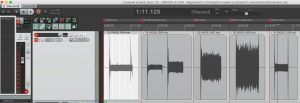When I took the Falcon to Drew’s last week it sounded great, but we noticed it was pretty noisy (hum/interference-type noise, not the good kind). So I’ve been on a zag to improve the power filtering. I’ve added a part to #0001, and will add it and change the value of another part for future builds.
Here’s a test running several pedals direct into Reaper with their controls dimed:
- Falcon (pre-change)
- Fulltone GT500 (OD side, then distortion side)
- Moog MF Drive
- BYOC Large Beaver (EHX Triangle Muff specs, with a larger input cap)
- Falcon (post-change)
This test did not control for different levels of gain available from each pedal; while it looks like the Large Beaver is the noisiest pedal, it’s also the fuzz in the group and probably has the most gain available.
While today’s change didn’t reduce the Falcon’s noise in dB it did change the frequency of the noise some, reducing bass frequencies. I judge this to be an improvement.
An ear test with the Falcon maxed out vs. the MF Drive set for a similar gain and sound resulted in similar noise levels between the two pedals. This lets me feel like the Falcon’s noise is acceptable, if not necessarily optimal. The tradeoffs for better power filtering internally are a greater part count and/or a small loss of voltage available to the circuit.
I’ve learned a way to further reduce the switch pop you see at the beginning and end of each test (the large spikes when turning the pedal on and off). It’s impractical to go back and implement on model #0001, but I’ll incorporate it into future builds. #0001’s pops are already comparable to many high-quality pedals – usually passing unnoticed, especially playing into a dirty amp – so hopefully this change will reduce future Falcons’ pops below average.

